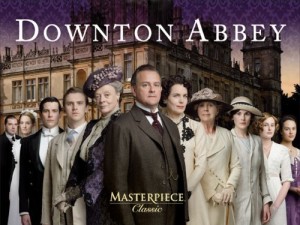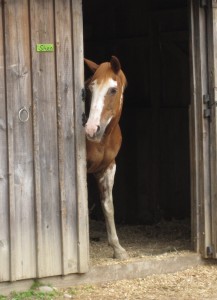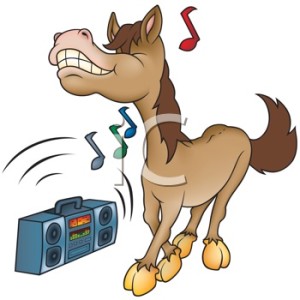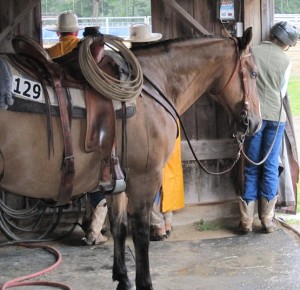By Maddy Butcher Gray
Dogs love Down ton Abbey.
ton Abbey.
It’s true.
My dog watches it with me every week.
That’s far-fetched reasoning, of course, drawn up by much subjectivity and human interpretation. And it reminds me of two recent studies on music and horse behavior:
A group at the University of Queensland, Australia, played the Forrest Gump theme song for six weanlings all day and compared their heart rates to un-Gumped weanlings.
Another study at Hartpury College in England, compared the behavior of eight geldings when exposed to periods of jazz, classical, country, and rock.
The scientists get kudos for taking some compelling first steps to document horse behavior as it relates to music. Both acknowledge that further studies will help elucidate the ways in which horses may benefit from auditory experiences. Hats off for these initial, albeit small-sized studies.

But before researchers plan follow-up studies, let’s consider filling in some holes of reasoning and viewing the larger question of how sound, not music, affects horses.
We humans recognize music as one kind of sound. We know it has melody, harmony, and rhythm. Music varies by its timbre, key (major or minor), instrumentation (voice, horns, strings, etc.) and percussive effect.
Through our upbringing and social interactions, we’ve learned to quantify music as soothing, rambunctious, mellow, or unnerving. Each of these qualifiers varies from person to person, family to family, culture to culture.
I love country. My kids don’t.
Bolliwood radio is big in India. Not here.
How do we know horses can differentiate music from sound or noise?
Both studies seem to make this presumption. It’s a cart-before-the-horse kind of flaw.
In the Queensland study, researchers put stallions next to the weanlings with the knowledge that studs tend to rile up the babies. They found that playing music decreased the time a weanlings’ pulse was elevated with stallions near.
Their control was no music.
 As in no recorded sound.
As in no recorded sound.
But what if playing Forrest Gump simply drowned out other noises that might have aroused the young horses if only they heard them?
Would white noise, dolphin calls, or fax machine screeches have had the same positive impact?
Before we conclude that music soothes horses’ souls, we might examine the more general impact of noise on heart rate. We may find, for example, that any sound that minimizes or drowns out the various intimidating stallion sounds will benefit the young ‘uns.
In the Hartpury study, a catalog of equine behaviors – ranging from relaxed to stressed – substituted for heart-rate monitoring as indicators of their horses’ well-being. According to their behavior catalog or ethogram, Hartpury horses got jazzed up by jazz, but acted more restful with classical and country.
Most of us humans can distinguish musical genres. Horses cannot.
Before researchers dive into what kind of country music horses prefer (I’m nonetheless rooting for Miranda Lambert!), let’s find out if they act more relaxed or jazzed by white noise or talk radio.
To their credit, the Hartpury researchers hinted at possible attributes for calm or excitatory music (namely, tempo and key). But to say that horses are better off listening to country music is misleading, since we can find find slow songs, fast songs, sharp songs, and flat songs within any genre, country included.
Hartpury, by the way, selected Hank Williams. Really.
Back to my dog and Downton Abbey:
It is true that she lies down beside me and watches it. She appears happy and at peace.
- But does she just like lying next to me?
- Is she feeding off my own behavior of restful contentment?
- Did she see a dog or hear a bark on TV once and is waiting to see or hear it again?
- Does the TV emit nice sounds that only dogs can hear?
To say she likes Downton Abbey is simply skipping past all these possibly more plausible notions.
Sound familiar?
Good afternoon,
I will do a study on the influence of differente type of music in agressivityduring the feed in horses for my bachelor travel and I would like to know the source of your interresting article.
Thanks for your time
Elodie
Hello Elodie, Please see links within the article. Thanks for your interest.